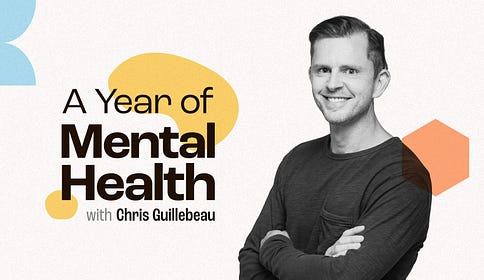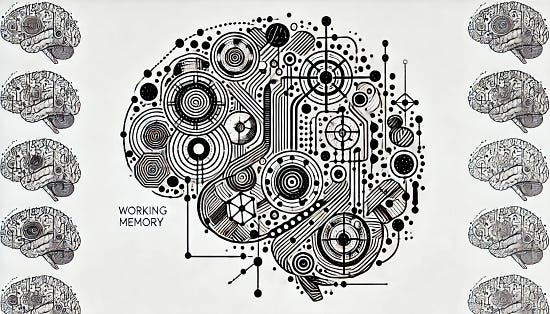I made a Reel recently where I said, in effect, if you want to get better at life, get better at executive functions. Executive functions are the brain skills that help you organize your thoughts, control your actions, and get stuff done. If you’re neurodivergent—or even if you just sometimes think differently; don’t worry about the label—you probably struggle with executive functions. A few previous entries in this series: One that we haven’t talked about much yet is working memory. So let’s do that! What Is Working Memory?Working memory is like your brain's notepad or sticky note. It's the ability to hold and manipulate information in your mind for a short period. Think of it as the mental workspace where you juggle thoughts, process information, and work on immediate tasks. Note: If you have a hard time with working memory, it doesn’t just mean “being forgetful.” There’s more to it! Common challenges with working memory include: Losing track mid-task: You start making dinner, then suddenly realize you can't remember if you added an ingredient or not Difficulty following conversations: In meetings or social gatherings, you might struggle to keep up, especially when multiple people are speaking. Misplacing items: You put down your keys or phone, and minutes later, you have no idea where they are. Trouble with mental math: Calculating tips or trying to add up grocery items in your head becomes a frustrating experience. Difficulty remembering names: You meet someone new, and their name seems to vanish from your mind almost immediately. Getting easily distracted: You start a task but find your mind wandering, unable to hold onto the goal or steps needed. Struggling with complex tasks: Activities that require holding multiple pieces of information in mind (like following a new recipe) can feel overwhelming. These challenges can be frustrating. They may impact daily life in various ways, leading you to wonder “What’s wrong with me?” What’s wrong is a struggle with executive functioning, or in this case, with working memory in particular. SolutionsSo what can be done? Well, the usual advice first applies: if there’s a major problem in your life, don’t be surprised if your working memory isn’t great. Your body needs sleep, nutrition, and hydration. Assuming you know that and are working on those things—it’s always a process, of course—these two ideas might be helpful. 1. Practice "Task Shedding" Instead of MultitaskingRather than attempting to juggle multiple tasks simultaneously (which can overwhelm working memory), intentionally choose what to focus on and what to let go. This isn't about doing less, but about reducing cognitive load. When faced with multiple tasks, explicitly decide which one is most important right now. Write down or make a voice memo of the others so you can release them from your working memory without anxiety. Return to the list only when you're ready to switch tasks. 2. Develop Personal Shorthand for Complex TasksInstead of trying to remember all steps of a complex task, create a personalized system of abbreviations or symbols that serve as memory triggers. This reduces the load on working memory while still keeping essential information accessible. Example: For managing a project at work, you might develop a shorthand like this:
So your daily to-do list might look like: "CM, UT-John, SR-Q2, SC-client, FU-invoice"¹ This compact format gives you a quick, scannable overview of your tasks without overwhelming your working memory with full descriptions. You can expand on each item as needed when you're ready to tackle it. The goal isn't to "fix" your working memory or make it conform to neurotypical standards. It's about finding ways to work with your brain's natural tendencies, reduce anxiety about forgetting, and make complex tasks more manageable. Have you struggled with working memory? What’s been helpful to you? Further Reading
1 Don’t worry if you don’t love this format, by the way: the key is to create a format that works for you. Personalized shorthand works best when it’s developed intuitively. You’re currently a free subscriber to 🌻 A Year of Mental Health. For the full experience, consider upgrading! |
Friday, September 20, 2024
Working Memory, or Why You Keep Forgetting Everything
Subscribe to:
Post Comments (Atom)
The Best of Global Markets: Navigating Risks and Opportunities Around the World
BoF is away for its annual break until 2nd January. In the meantime, we invite you to explore highlights of our news and analysis from t...
-
insidecroydon posted: " Become a Patron! What's on inside Croydon: Click here for the latest events listing...




No comments:
Post a Comment